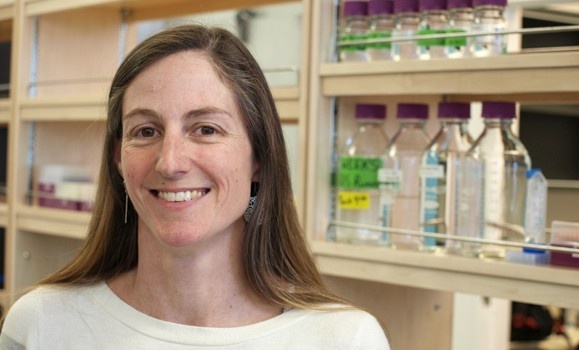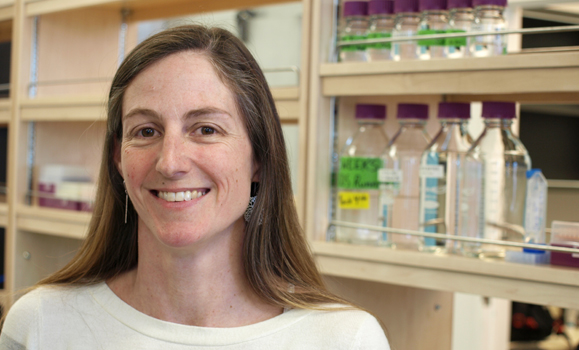Media Releases
» Go to news mainDal researchers identify cell‑changing gene that can cause cancer

(HALIFAX, N.S.) - May 11, 2015 - Researchers at Dalhousie Medical School have discovered that a gene found in a common herpes virus plays a key role in the development of several AIDS-related cancers – including a form of skin cancer known as Kaposi’s sarcoma.
The study was recently published in PLoS Pathogens, the leading journal in the field of infectious pathologies, which include virus-induced malignancies.
“We’re looking at how viral genes, such as those found in herpesvirus-8, contribute to the development of cancer,” says Dr. Jennifer Corcoran, assistant professor in the departments of Microbiology & Immunology and Surgery.
Herpesvirus-8 targets cells that line the surface of blood and lymphatic vessels. Using one of its genes, Kaposin B, the virus reprograms these cells. It gives the cells instructions to grow, form new vessels, and inflame surrounding tissues. These changes in the cells can lead to cancer.
“We’ve found that inside the cell, Kaposin B targets a control switch that’s normally only activated when the cell senses a threat, and then quickly turned off when the threat is averted,” explains Dr. Corcoran. “Kaposin B appears to jam this switch in the ‘on’ position, causing dramatic and sustained changes in cell behaviour.”
It’s estimated that 15 to 20 per cent of cancers are caused by viruses. Dr. Corcoran’s discovery points to potential new treatments for these cancers; some may even be able to be prevented.
“The research is telling us that Kaposin B is a very unique kind of viral cancer-causing gene, very different than others we have studied before,” says Dr. Corcoran. “Understanding how this gene works has already revealed some opportunities for using drugs to reverse its effects. And if we target the Kaposin B protein – or use molecules that target and limit the changes Kaposin B causes to the blood and lymphatic system – we could potentially limit cancer development.”
Inflammation has long been associated with the growth of cancer. The Dalhousie research team is hoping its work on the Kaposin B study will lead to better understanding of that link, too.
“By looking at the function of Kaposin B, we are also learning new molecular details about the relationship between inflammation and cancer,” says Dr. Corcoran. “Our findings may ultimately have implications for the treatment of other cancers that have a strong inflammatory component.”
-30-
Images
 |
New Cancer Research Dr. Jennifer Corcoran, researcher and assistant professor in the departments of Microbiology & Immunology and Surgery. (Photo: Allison Gerrard) Download Hi-Res image |
Media Contacts
Allison Gerrard
Dalhousie Medical School Communications
1 (902) 494-1789
allison.gerrard@dal.ca
Cory Burris
Dalhousie Medical School Communications
cory.burris@dal.ca
1 (902) 494-4247
Comments
comments powered by Disqus
Recent News
- Media opportunity: Researchers reveal the critical role metabolism plays in reducing the risk of frailty in older adults and how the two are closely linked
- Press Release ‑ Introducing Dalhousie University’s 2024 Board of Governors' Award winners
- Media opportunity: Repeated, small hits to the heads of football players may damage the small blood vessels of the brain: Dalhousie University research
- Media release: Dalhousie‑led initiative awarded $1.9M in federal funding to help agriculture sector meet emission reduction targets
- Dalhousie announces launch of Bringing Worlds Together—a $750‑million campaign for transformational change
- Please join Dalhousie University for a special announcement
- Media opportunity: Dalhousie University researchers find migrant workers in Nova Scotia face discrimination, overcrowded housing and wage theft, but also receive support from their home countries in addressing mistreatment
- Media opportunity: Fowl language: Dalhousie University researcher uses AI to crack the code of clucks and unravel chicken chatter secrets, opening the door to an improved quality of life
